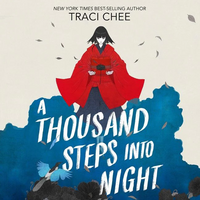Take a photo of a barcode or cover
funny
hopeful
inspiring
medium-paced
Plot or Character Driven:
A mix
Strong character development:
Yes
Loveable characters:
Yes
Diverse cast of characters:
Yes
Flaws of characters a main focus:
Yes
I was surprised by the story moving so fast and arriving at what I thought was the conclusion (based on the blurb) half-way through. But that left space for a delightful turn of events and delving deeper into the main character's story.
I really did enjoy this book - it was fast to read and entertaining and fascinating the entire time.
I understand the footnotes with pronunciations and explanations for specific concepts. To me peronally it felt a bit disruptive for the story, but that's just a me thing.
I really did enjoy this book - it was fast to read and entertaining and fascinating the entire time.
I understand the footnotes with pronunciations and explanations for specific concepts. To me peronally it felt a bit disruptive for the story, but that's just a me thing.
Moderate: Murder, Classism
This is one I'll recommend to a lot of people, and look for other books like it. I found this book so creative--uniquely fantastical, whimsical, dark, and really reminiscent of various eastern folklore symbolism. The character was an awesome example of a feminist heroine, deeply uncomfortable about structural sexism and not unwilling to take action (even if she is afraid). She feels real and relatable for a cursed "demon lady" (her name is MIUKO!!!). The other characters are cute and have interesting backgrounds. This story was an adventure that kept going. Not a book with romance, shockingly, though friendship is keenly important.
Don’t know if I wasn’t into this book or just entirely too long but I was ready for it be done like 4 hours earlier than it did.
adventurous
mysterious
tense
fast-paced
Plot or Character Driven:
A mix
Strong character development:
Yes
Loveable characters:
Yes
Diverse cast of characters:
Yes
Flaws of characters a main focus:
Yes
adventurous
challenging
medium-paced
Plot or Character Driven:
Character
Strong character development:
Yes
Loveable characters:
Yes
Diverse cast of characters:
Yes
Flaws of characters a main focus:
Complicated
It started a bit slow, but picked up speed. I enjoyed it.
DNF at page 271, but I'm marking it as read because I did read more than 50% of the book.
This should have been a great book for me, I'm a crazy Studio Ghibli fan, but alas it wasn't.
The author lost me the as soon as the MC went back in time. I hate stories with time traveling, they become extremely convulated. Also, she becomes a demon and doesn't want to kill anyone? For shame. It also seemed that the story became more childish in the second part and I can't be bothered anymore.
Lovely writing, though.
Two stars because the first part of the novel was really engaging.
This should have been a great book for me, I'm a crazy Studio Ghibli fan, but alas it wasn't.
The author lost me the as soon as the MC went back in time. I hate stories with time traveling, they become extremely convulated. Also, she becomes a demon and doesn't want to kill anyone? For shame. It also seemed that the story became more childish in the second part and I can't be bothered anymore.
Lovely writing, though.
Two stars because the first part of the novel was really engaging.
I had trouble staying engaged with this one. The world is cool. The idea is cool. But the execution is lacking.
adventurous
dark
emotional
hopeful
fast-paced
Plot or Character Driven:
A mix
Strong character development:
Yes
Loveable characters:
Yes
Diverse cast of characters:
Yes
Flaws of characters a main focus:
Yes




